28 May 2018
A thought-leadership SWOT analysis of the PATA Annual Summit 2018
Gangneung, Gangwon Province, South Korea: The most perceptive thought-leadership question asked during the PATA Annual Summit 2018 was by Christina Luo Xiao Yan, 21, a student of Hotel Management at Macau University of Science and Technology. After listening to the speaker, Ms Raya Bidshahri, the Canadian-based CEO of Awecademy, an online platform, discuss the impact of technology on travel trends, she asked point-blank: Why should young people be studying tourism at all if their jobs are to be taken over by robots?
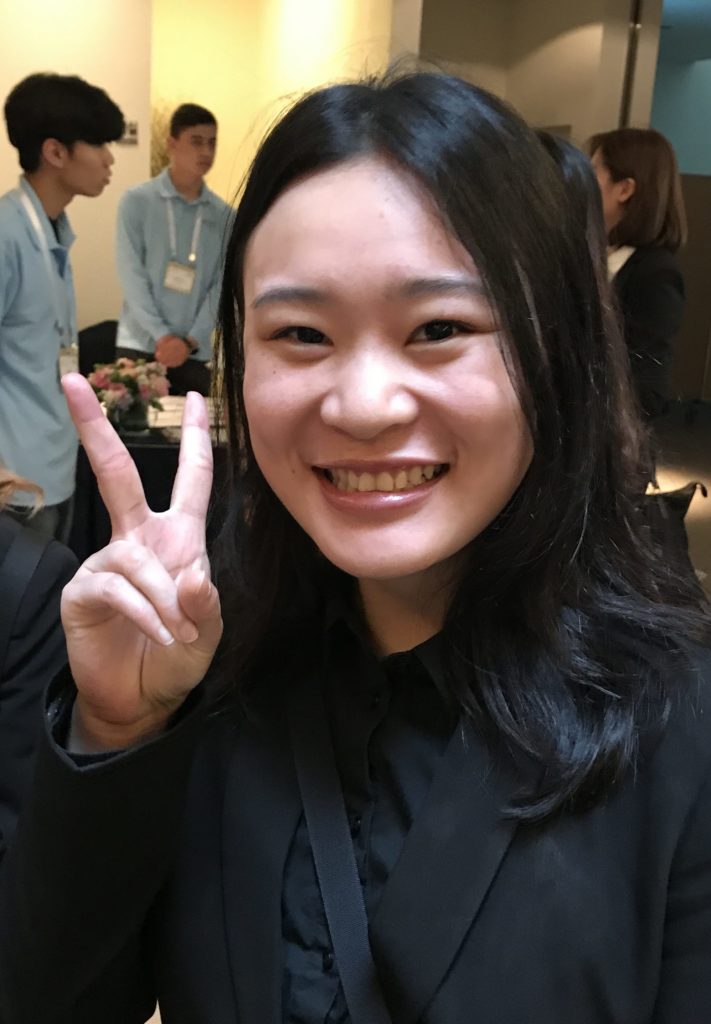 Christina Luo Xiao Yan |
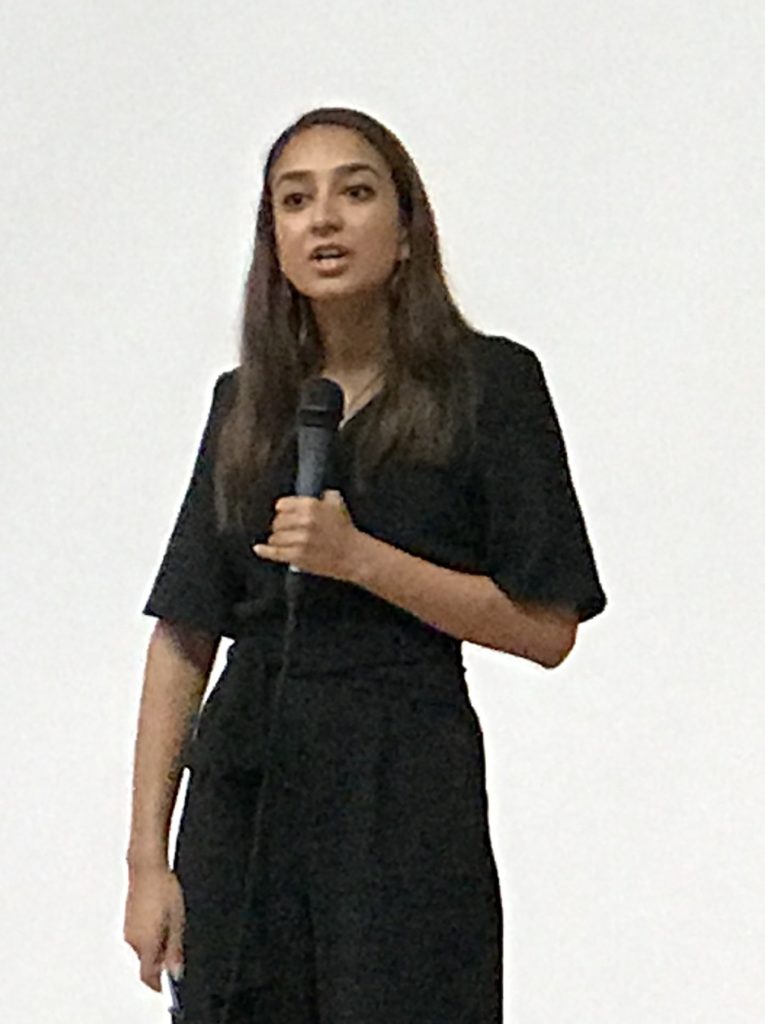 Raya Bidshahri |
Briefly caught off-guard, Ms Bidshahri stumbled before saying that robots will take over the repetitive, mechanical jobs but those which require more complex decision-making, emotional contact or problem-solving skills will still require a human element. She was pressed on the same topic by another student from Pusan university who asked what the current group of young students are supposed to do? Ms Bidshahri said people will have to upskill and find new jobs in other areas. The student retorted, “If you are a housekeeper, it may be too late to change or shift to new jobs.” Ms Bidshahri responded that it would be no different from other jobs which had to adapt due to technological changes, such as factory jobs which were impacted by the Industrial Revolution.
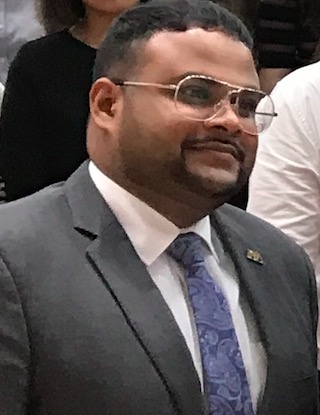 Abdulla Ghiyas |
Another blistering thought-leadership question came from PATA’s current Face of the Future, Mr. Abdulla Ghiyas, 33, President of the Maldives Association of Travel Agents and Tour Operators. One of the four panelists in a debate on the topic of the Greatest Challenge Facing Travel & Tourism, Mr. Ghiyas delivered a passionate presentation on how his archipelagic country is facing extinction due to rising ocean levels caused by global warming. He said, “On June 01 2017, one of the largest (pollutant) emitters in the world pulled out of the 2015 Paris climate agreement. Massive activist movements are sadly failing. And the hard reality is that there is no real solution at least in the near future.” His thought-leadership question: “So What Do We Do”?
A third thought-leadership question was posed by Mr. Peter Semone, Founder and President, Destination Human Capital. During the Industry Council meeting, which he was chairing, he asked the roughly 30 participants, all senior management executives at various companies and institutions, for a show of hands: “How many of you are familiar with the UN Sustainable Development Goals?” Only six hands went up.
Touted as gatherings of “thought-leaders, industry shapers and senior decision-makers”, PATA annual summits are struggling to live up to the buzzword clichés. Attendance has fluctuated from 350 international and local delegates at the 2015 summit in Leshan, China, to 640 delegates at Guam in 2016, 406 in Sri Lanka in 2017 and now 372 in Gangwon, Korea, this year. By comparison, the last time the PATA annual conference, the predecessor of the annual summit, was hosted in Korea in 2004, the turnout was a record-breaking 2,140 delegates.
Why is this happening? PATA still seems to be a little unsure. In his briefing to the board, CEO Mario Hardy, tasked with reviving PATA’s fortunes in the face of strong head-winds, said a number of meetings have been conducted amongst staff and other stakeholders to focus on thought-leadership questions such as: Why do we exist? What do we do? Why are we doing it? Should we be doing things differently?
In the midst of what PATA itself recognises as a world of uncertainty and instability, PATA the physician is still looking for ways to heal itself.
Mr. Hardy says he spends a lot of time talking and listening to his stakeholders and constituents. He told the board that one of the most important thought-leadership pointers he gets, especially from government members, is that they want PATA to offer guidance and show them a pathway in these perennially challenging times. However, another thought-leader, Stephen Pearce, Vice President Marketing of Tourism Vancouver and former PATA Treasurer, said private sector members were only interested in the bottom-line. Their questions are: “What have you done for me lately? Don’t tell me what you did last year, but what are you doing next year? How are you going to add value to my business? How are you relevant to my bottom line?”
The PATA summit 2018 raised some important thought-leadership issues. It claimed to be a gathering of “travel’s most innovative thinkers” who will focus on the theme, “Building Bridges, Connecting People: How Collaboration Creates Opportunities”. However, equally important as Connecting People is the need to connect the dots, learn the lessons of history and avoid past mistakes.
The crucial thought-leadership question PATA’s innovative thinkers and decision-makers are consistently failing to ask is: “Why did we go from an attendance of 2,140 in 2004 to 372 in 2018? What did we do wrong?” Not surprisingly, none of them blame themselves. The tendency is to always hold external parties, circumstances and events responsible.
In fact, thought-leadership solutions and innovative thinking were embedded in the fabric of this year’s PATA summit, which also turned out to be a SWOT analysis of sorts.
STRENGTHS
The most important strength that will revive PATA is the ongoing atmosphere of openness and transparency. Board meetings are open to the media. Board working papers, business plans and finances are all available in the public domain. An annual report is being issued. All this builds trust and facilitates progress by thwarting backdoor speculation of hidden agendas. Mr. Hardy believes, rightly, that if he can restore trust and good governance, the rest will follow.
The second strength is that the finances are back in good shape. The absence of any serious external shocks, small but consistent attendance at smaller events and continued interest in hosting bigger PATA events such as the Travel Mart has helped restore reserves to nearly US$1 million. Mr. Hardy is planning to double the reserves again in the next two years. New members totalled 102 but pullouts totalled 106. Big-ticket destinations and multinational corporations are still missing, but there is increasing interest from SMEs, young people and companies/tourism boards outside the Asia-Pacific region. Mr. Hardy said that the “yield per member” is up, meaning more high-paying members have signed up.
WEAKNESSES
In the old days, PATA annual conferences would begin with a State of the Union, a broad thought-leadership analysis of visitor arrivals and a roundup of economic trends. No longer. The result is the absence of a realistic, warts-and-all roadmap to navigate the geopolitical, economic, social and cultural and ecological challenges. This missing link also makes it virtually impossible to pursue an advocacy agenda. If PATA cannot pinpoint what challenges it faces, how can it take a thought leadership position on any of them?
So far, the focus has been excessively on technology, which is more Mr. Hardy’s pet subject rather than an over-arching industry-wide challenge. At the Sri Lankan summit last year, one of the lead speakers was Rafat Ali, CEO of Skift. This year it was Raya Bidshahri. The global travel & tourism events calendar overflows with technobabble. Last year, Mr. Hardy talked about his participation the Singularity University. This year, he briefed the board on the implications of the GDPR. PATA is also working with Google on another project.
Technology is always positioned as a benign agent of change. But the recent revelations about geopolitical manipulations and machinations have proved that is a fallacy. The hidden agendas of these giant social media companies requires much deeper thought-leadership scrutiny and debate. So far, that is missing in PATA technobabble forums. Innovative thinking does not mean parroting the party line and presenting a sunny-side-up perspective, but rather challenging it with the kind of critical thinking questions asked at the Youth Symposium.
OPPORTUNITIES
The word “Opportunities” was explicitly mentioned in the PATA 2018 summit theme: “How Collaboration Creates Opportunities”. Some clear opportunities are emerging:
Peace-building. The summit in Korea would have been just another ordinary travel summit had it not suddenly gained a higher level of importance by the nascent Korean peace process. The promise of peace, and the fruits it would yield, brightened up the atmosphere like nothing else. There was a clear connection with last year’s summit in Sri Lanka, which is also hoping to reap a peace dividend. The next major PATA event will be in September 2018 in Malaysia, where a peaceful regime-change has taken place via the ballot box. The 2019 PATA annual summit will be held in the Philippines, which is also dealing with some peace and conflict issues.

==============

Former UN Secretary-General Ban Ki-Moon offered some exceptional thought-leadership pointers on advancing a Peace Agenda. PATA also signed a Memorandum of Understanding with a prominent Buddhist temple in Korea to promote peace and understanding. Although the tourism industry abounds with peace tourism projects and activities, they are mostly abstract talk-shops. If PATA’s new-found collaboration and connection with a Buddhist temple and the ex-UN chief is to create some genuine opportunities, it will have to generate some walk-the-talk thought-leadership action.
One country pleading for some peace-building attention is Pakistan. Once prominent on the PATA events list, the beautiful, culturally-rich country is represented by the chairman of the PATA Pakistan chapter Col (Rtd) Akbar Shareef of Rakaposhi Tours. He again pleaded for PATA to put together a media fam trip, offering to host all land arrangements. Although that is perhaps low on PATA’s priorities, Col Shareef is sill pushing to raise Pakistan’s profile on the PATA roster of activities. There is a clear window of opportunity for both collaboration and connection to help a destination that badly needs it.
The debate: Held for the second time at a PATA forum (the first one was at the 2012 PATA Youth Forum in Manila between former PATA CEO Martin Craigs and this editor), this “debate” saw an outpouring of genuine “thought-leadership”. Intellectually stimulating arguments focussed on the theme “What is the Greatest Challenge facing Travel & Tourism.” It did not fit the strict definition of a debate. As the moderator, BBC presenter Sharanjit Leyle, pointed out at least four times, both sides often found themselves on the same side of the fence in discussing whether “over-capacity” or “crisis management and resilience” was a greater challenge. Issues like the closure of Boracay and the global warming threat to the survival of the Maldives both came to the fore. In the votes cast by the audience via the online poll, the two representatives from island nations, Maldives and Jamaica, edged out the two representatives from one city destination, Macau, and one OTA.
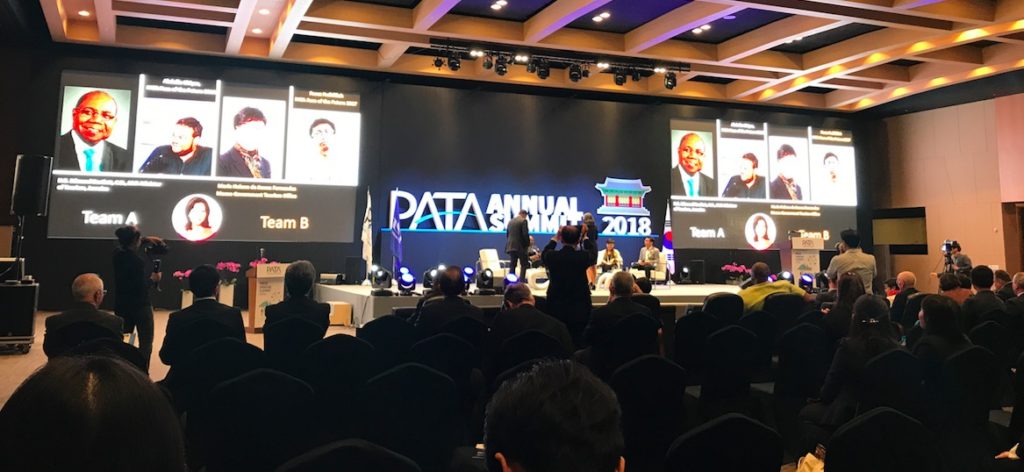
The debate in session
However, winning or losing was not the point. Thought-leadership debates are a long overdue item on global tourism conferences. There is no shortage of material to challenge the current drift of travel & tourism as it increasingly becomes a victim of its own success. Many issues that could be subjects of future debate came up in the numerous questions posed by audience via the sli.do audience interaction service that has replaced the erstwhile human-touch Q&A at PATA events.
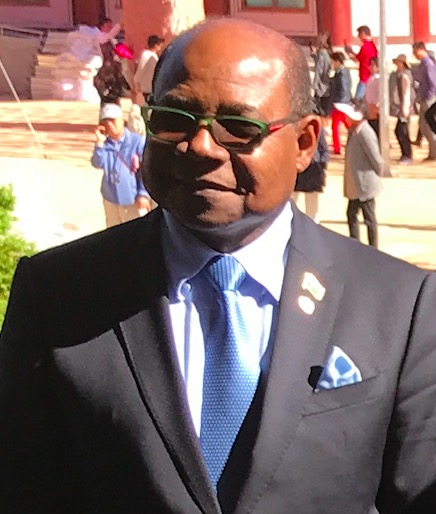 Edmund Bartlett |
Connecting with the Caribbean: For the first time, a tourism minister from the Caribbean attended a PATA summit. Mr. Edmund Bartlett’s first foray into Asia has opened up a first rate thought-leadership opportunity to Build Bridges and Connect Peoples of the Caribbean and the Asia-Pacific. Mr. Bartlett proved his mettle during the debate with a clear and precise articulation of the subject matter. He was due back in Asia on May 30 to participate the UNWTO Gastronomy Tourism Forum in Bangkok.
Chapters: The backbone of the association for many years, chapters provided the bulwark support by thousands of SMEs worldwide. These were the frontline troopers without whom PATA was only an organisation of generals. Today, the chapters stand decimated. Attendance at the “chapters colloquium” at the 2018 summit was about 50. That was touted as being the best in two years, which is really not much of a comparison.
Individual chapters are rapidly losing members because young entrepreneurs see no relevance for old-style networking in a high-tech age. Mrs Benjakaliyani (Ben) Montgomery of the Thailand chapter pointed out that its members had dwindled from more than 100 to just 24. There is not much thought leadership left in them. Although the young student chapters still have some energy, most of the young people see it as merely a means of finding a job. Once that purpose is served, staying on is a debatable proposition.
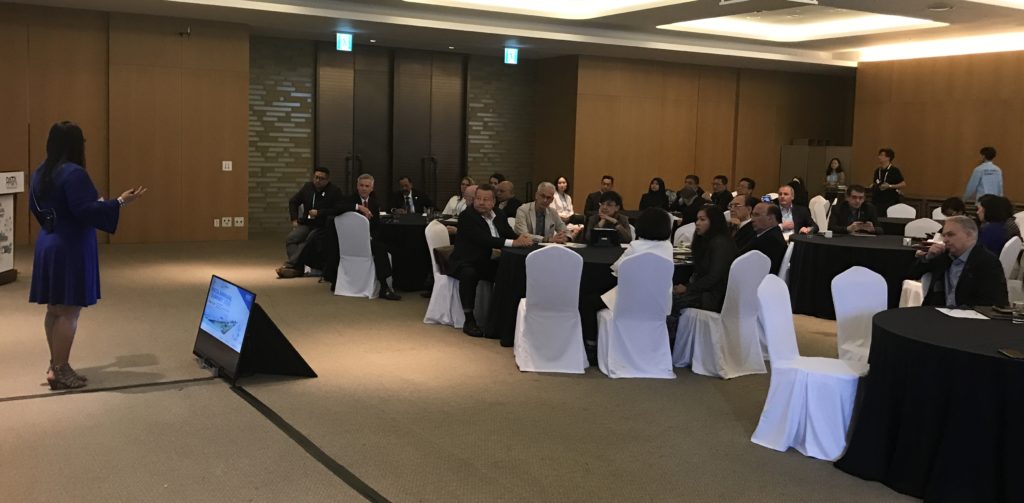
The chapters colloquium in session
THREATS
Polarisation: PATA chairman Chris Bottrill reported to the board on the results of a pulse-feeling survey to ascertain members’ views on how effectively and productively they were spending their time. Two key slides of the outcome are being reproduced below. In summary, Prof Bottrill said there was a polarization setting between members who gain an enormous amount from their membership and those who don’t. That chasm alone is worth some thought-leadership investigation. As Prof Bottrill is now the PATA chairman, he has a chance to do one.
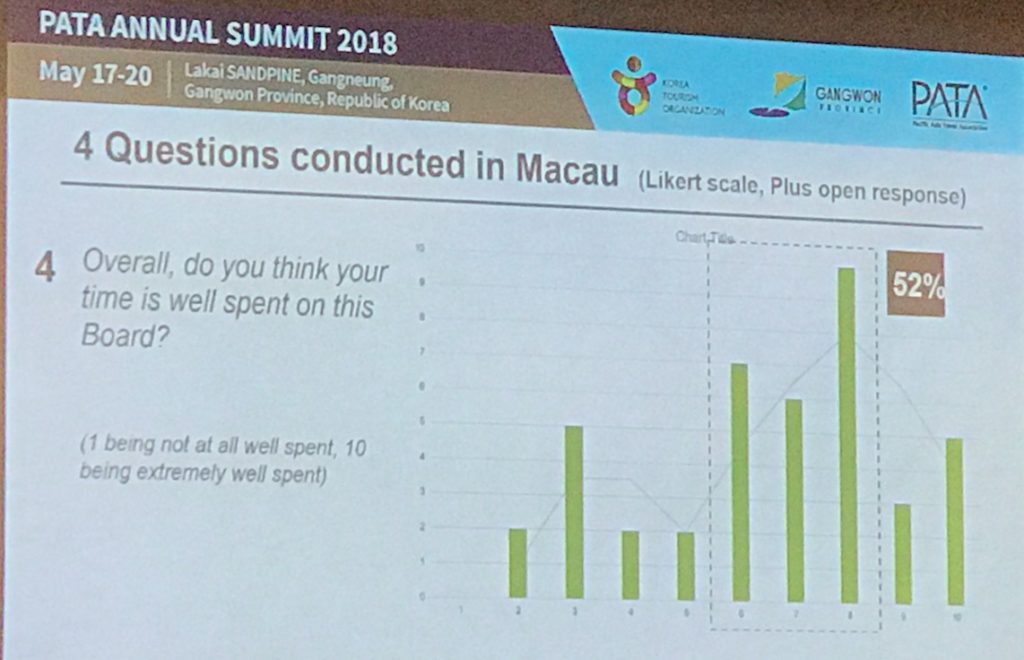
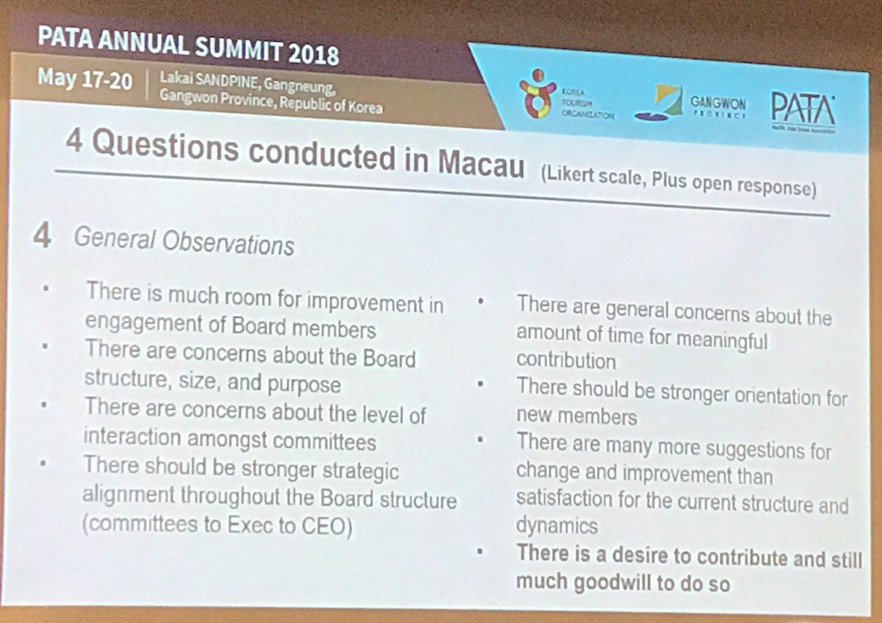
Management diversity: PATA has got a new chief of staff, Trevor Weltman. This means PATA is again top heavy with non-Asians — a Canadian chairman, a French-Canadian CEO and an American chief of staff. Luckily, Dato Azizan Noordin of the Langkawi Development Authority, Malaysia, was elected vice chairman which may balance the line-up and make it more reflective of PATA’s ethnic and cultural diversity. This shortfall, too, is worth a thought-leadership debate. PATA has never had an Asian CEO since moving to Bangkok in 1998. It’s senior management has consistently been top heavy with non-Asians. Why? Are Asia’s teeming billions incapable of producing top-class leaders?
CONCLUSION
This was the promise made in the marketing pitch of the PATA Annual Summit 2018: “PATA understands that vitality of the industry can only be maintained through the concerted efforts of all stakeholders, working in harmony and unison to build bridges and not walls. The PATA Annual Summit 2018 conference will look at the various connections that are helping to shape the industry as we move towards a more exponential future, bringing together a diverse lineup on international thought leaders, industry shapers, and senior decision-makers who are professionally engaged with the Asia Pacific region.”
I have no idea what “exponential future” means or how it would differ from a non-exponential future. Having covered PATA annual conferences and summits since 1981, I know that PATA is always looking to the future, exponential or otherwise. What it consistently fails to do is to take a good hard look at the past and better understand how to learn from it. Mr. Hardy took over as PATA CEO in 2014, the same year as the military takeover in Thailand. The peace and order imposed on the country by the National Council of Peace and Order is the main reason why PATA is being able to rebuild itself. However, the entire Asia-Pacific is still in a state of flux. The next crisis will be PATA’s real trial by fire. Taking a leaf from the manual of health & wellness tourism, prevention may be better than cure.
That could be the thought-leadership theme of an entire PATA Summit in its own right.
